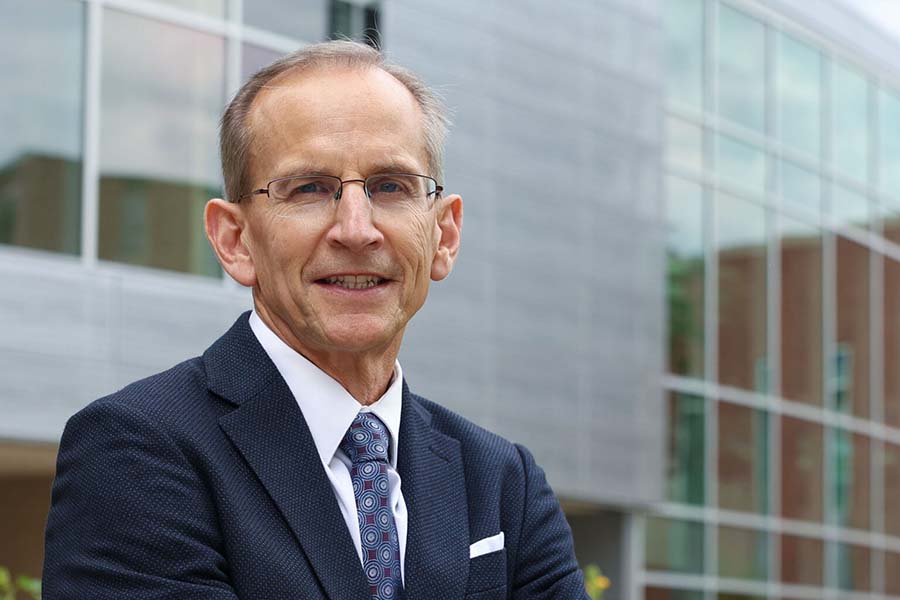How can I request to attend the UNMC College of Medicine on the Kearney campus?
All students, no matter their preference of where to train, will apply and be accepted into the UNMC College of Medicine using the same application and interview process. Applicants will be asked to indicate their preferred campus after their interview. This information will be kept confidential from the admissions committee. Near the end of the process and after acceptance, the college will assign students to a training site accommodating their preferences as much as possible while considering fairness.
As a KHOP or RHOP student, am I guaranteed a spot in Kearney?
A student’s RHOP or KHOP status will be taken into consideration when campus placement is determined, but Kearney placement is not guaranteed.
As an RHOP/KHOP students, will I be required to go to the Kearney campus?
No. RHOP/KHOP students will be asked their preference, as will all other students.
What will the instructional facilities look like?
Medical students at the Kearney campus will participate in instruction in large group classrooms, small-group rooms and a gross anatomy lab. There also is a clinical simulation center, which has identical capabilities and technology to those available in Omaha. In addition to instructional facilities, ample study spaces will be available for students. Students will have full access to UNMC’s Leon S. McGoogan Health Sciences Library, with a catalog of resources available online or through intra- and interlibrary loan, as well as the assistance of an onsite library liaison.
Will academic and career advising be different on the Kearney campus?
- Student Affairs meetings: Many meetings with deans and other advisors currently are done remotely. In addition, on-campus representatives of the UNMC Office of Admissions and Student Affairs will be present.
- Directors of Academic Advising meetings: All Kearney students will be assigned an academic advisor; these meetings currently also are done remotely. However, an on-campus faculty academic advisor also will be available.
- Tutoring: Tutoring will be delivered both in-person on the Kearney campus and remotely.
If I go to Kearney campus, am I expected to go into primary care? Will other clinical rotations be available?
The full range of residency opportunities, not simply primary care, will be available. Most clinical experiences are available in Greater Nebraska, including all required rotations and many subspecialty electives. Certain specialized rotations (e.g. transplant surgery) will only be available at the Omaha campus. However, Kearney-based students will be able to participate in these rotations in Omaha if they choose.
Can students transfer to Omaha (or Omaha students to Kearney) post-matriculation?
Students will not be able to transfer between campuses during Phase 1. However, as the curriculum is identical, students can choose to take clinical rotations in Phases 2 and 3 in Omaha or Greater Nebraska depending on their interests.
Why is there a UNMC College of Medicine at Kearney?
The Kearney campus will expand opportunities for medical students to train in Greater Nebraska, particularly in rural and smaller communities, with the aim of increasing the number of physicians of all specialties that will practice throughout the state. This also provides a chance for some students to choose to complete medical school closer to home communities.
Does the UNMC College of Medicine at Kearney have a different or unique mission?
No. The mission of the medical programs at the regional campus in Kearney and the main campus in Omaha is the same. The mission of the College of Medicine at the University of Nebraska Medical Center is to lead the world in transforming lives to create a healthy future for all individuals and communities through premier educational programs, innovative research, and extraordinary patient care.
What attributes are you looking for in a successful student for the first medical class in Kearney?
As in any organization, trust and performance are two key characteristics that help develop a healthy culture. We are seeking individuals who are adept at working effectively in teams and supporting one another. With the smaller campus size in Kearney, there will be an emphasis on creating this type of nurturing community.
What is unique about attending the college’s Kearney campus?
The most unique aspect of attending the Kearney campus is the opportunity to live, study and work in a more rural environment. Many students who choose to attend the Kearney campus will do so because they love the lifestyle that exists in rural areas. The small class size also will provide an opportunity to get to know the staff and faculty on a more personal level. Additionally, there will be an opportunity in Kearney to be involved in a community leadership program that will connect students with community members who will mentor leadership skills.
How will scholarships be allocated to Kearney students?
All UNMC medical scholarships are awarded through a standard process overseen by a committee. Merit-based scholarships are distributed based solely on grade data. Every student who meets eligibility for each donor-funded scholarship is equally considered, regardless of their location. The committee ensures that funds are distributed in an equitable manner among all students to the greatest degree possible.
What are the anticipated initial challenges of the UNMC College of Medicine at Kearney?
One initial challenge for the college’s Kearney campus will be establishing preceptor relationships with medical communities throughout Greater Nebraska. Many of these relationships already exist throughout the state, especially in primary care. However, these communities and partners will be asked to provide a much more immersive and longitudinal experience for medical students.
How can students contribute to the success of the UNMC College of Medicine’s Kearney campus?
The best way that students can help the Kearney campus succeed is by fully engaging with the curriculum and the faculty, as well as providing constructive feedback and availing themselves of opportunities to be involved in the programs, organizations and activities of both the college and the other programs at the Kearney campus.
